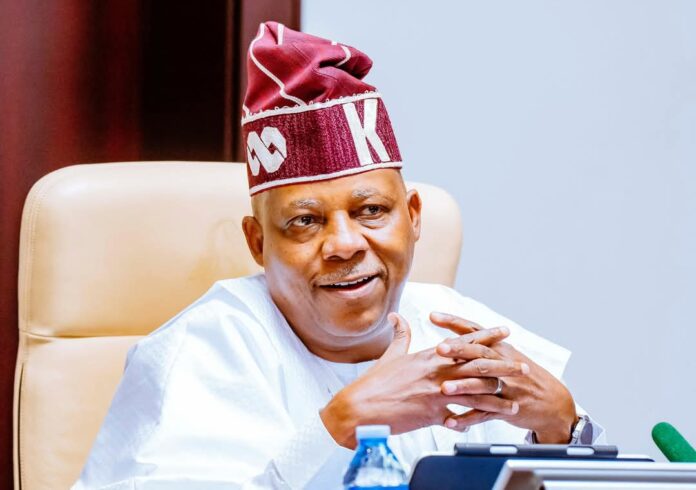By: Dr. James Bwala
Beyond the superficial rhetoric surrounding attendance at weddings and condolences, Shettima’s domestic engagements reveal a profound commitment to loyalty that transcends mere social obligation. In many political contexts, such public displays are often dismissed as symbolic gestures; however, Shettima’s consistent presence at such intimate events within his community underscores a deliberate strategy to nurture trust and solidarity among his constituents. This approach reflects an understanding of loyalty not just as political allegiance but as an embedded social contract reinforced through personal interactions.
Shettima’s attentiveness to family and community milestones functions as a tangible manifestation of reciprocal respect and support, which are critical in sustaining long-term alliances. Such engagements contribute significantly to consolidating political capital by fostering emotional bonds that formal political processes alone cannot achieve. Consequently, these actions speak volumes about his leadership style—one that privileges relational depth over performative politics.
In sum, analyzing Shettima’s attendance at weddings and condolence visits reveals how domestic engagements serve as vital arenas for demonstrating loyalty. By prioritizing these personal connections, Shettima solidifies a foundation of trust critical for effective leadership in complex socio-political landscapes. This dynamic illustrates the intricate interplay between private gestures and public loyalty within contemporary governance frameworks. By fostering these personal relationships, Shettima effectively bridges the gap between political expectations and genuine community engagement.
Through these actions, Shettima not only reinforces his political standing but also cultivates a sense of communal belonging that resonates deeply with the cultural ethos of his community. Such commitment to personal engagements underscores a nuanced understanding of leadership that prioritizes genuine human connection over mere ceremonial presence. In doing so, he navigates the delicate balance between fulfilling public duties and nurturing private relationships, thereby crafting a leadership approach that is both holistic and deeply rooted in the cultural fabric of his society.
This approach not only enhances his reputation as a leader who values interpersonal relationships but also aligns with the traditional expectations of leadership within his cultural milieu. Furthermore, by embedding himself in the social fabric through these engagements, Shettima exemplifies a leadership model that transcends conventional political paradigms. Moreover, Shettima’s consistent presence at both celebratory and somber occasions highlights his commitment to honoring the full spectrum of human experiences within the traditional African community.
By engaging consistently and meaningfully in these personal and community events, Shettima demonstrates a profound respect for the social customs that underpin his society’s values, thereby reinforcing a leadership style that is both empathetic and culturally resonant. This dedication to participating in life’s pivotal moments not only fortifies his bonds with constituents but also serves as a testament to the sincerity of his loyalty. Through this ongoing engagement, he not only strengthens his personal connections but also exemplifies a political ethos that prioritizes genuine human connection over mere rhetorical gestures.
In attending weddings and offering condolences, Shettima demonstrates a profound understanding of the social fabric that binds the African community, transcending superficial political maneuvering to foster a legacy of trust and solidarity. His consistent presence at such personal events signals a deeper allegiance to the people he serves, reinforcing his role as not just a political figure but a committed member of the community.
Through his unwavering presence at both joyous celebrations and somber gatherings, Shettima demonstrates a profound understanding of the cultural significance these events hold within the fabric of society. Shettima’s actions underscore a leadership philosophy that values authentic relationships, illustrating how personal involvement can transcend political rhetoric to create lasting community bonds. This approach to leadership—rooted in personal connection and cultural sensitivity—sends a powerful message about the true essence of loyalty, which is built on trust, respect, and genuine care for the well-being of others.
The Vice President’s approach highlights the importance of being present in both triumph and tragedy, reinforcing a leadership style that is deeply intertwined with the communal experiences and emotions of his constituents. In a political landscape often dominated by spectacle and posturing, Shettima’s commitment to engaging with his community on such an intimate level speaks volumes about the authenticity of his leadership. In doing so, he not only honors the traditions and values of his community but also solidifies a foundation of mutual respect and unwavering support.
His consistent engagement in these personal milestones not only reinforces his dedication but also exemplifies a model of leadership that prioritizes human connection over political convenience. His dedication to fostering these genuine connections reveals an understanding that true leadership is not merely about public appearances but about cultivating a sense of belonging and shared purpose. By weaving his personal engagements into the broader narrative of political duty, Shettima exemplifies a leadership style that prioritizes empathy and shared humanity, setting a standard for others to follow.
In recognizing the profound impact of these personal connections, Shettima not only strengthens his political alliances but also nurtures a community bonded by shared experiences and mutual understanding. Shettima’s domestic engagements serve as a testament to the power of loyalty and community cohesion in an era where such values are often overshadowed by political expediency. In an era where political figures often prioritize optics over substance, Shettima’s approach underscores a profound respect for the essential human connections that underpin effective governance.
* James Bwala, PhD, writes from Abuja.
End




